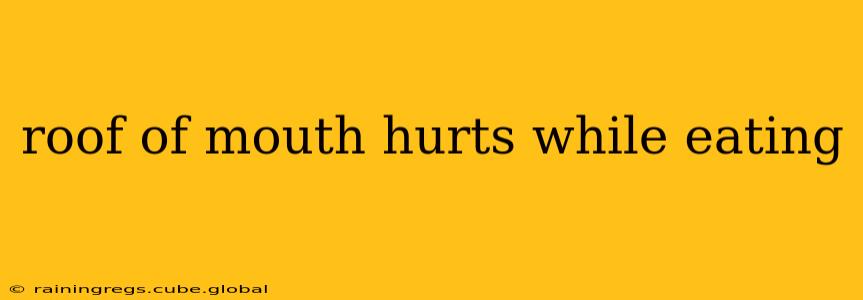Experiencing pain on the roof of your mouth while eating can be incredibly frustrating and disruptive. This discomfort can range from a mild ache to sharp, stabbing pain, making even simple meals a challenge. Understanding the underlying causes is the first step towards finding relief. This comprehensive guide will explore various reasons why your palate might hurt while eating, offer effective remedies, and advise on when professional medical attention is necessary.
What Causes Roof of Mouth Pain While Eating?
Several factors can contribute to pain on the roof of your mouth during meals. Let's delve into some of the most common culprits:
1. Oral Injuries:
- Burns: Accidental burns from hot food or drinks are a frequent cause of palate pain. The severity of the pain depends on the temperature and duration of exposure.
- Cuts or Abrasions: Sharp food, ill-fitting dentures, or accidental biting can lead to cuts or abrasions on the delicate tissues of the palate.
- Blisters: Repeated friction or irritation can cause blisters to form on the roof of your mouth. These can be quite painful when eating.
2. Oral Conditions:
- Canker Sores (Aphthous Ulcers): These small, painful ulcers typically appear on the inner lining of the cheeks, lips, or tongue, but can also affect the palate. They often heal within 1-2 weeks without treatment.
- Cold Sores (Fever Blisters): Although more common on the lips, cold sores can sometimes occur on the roof of the mouth. They are caused by the herpes simplex virus.
- Oral Thrush (Candidiasis): This fungal infection can cause white patches and pain on the palate. It is more common in individuals with weakened immune systems.
- Geographic Tongue: This benign condition causes patches on the tongue to appear smooth and red, but it can sometimes extend to the palate and cause discomfort while eating.
3. Systemic Conditions:
- Vitamin Deficiencies: Deficiencies in certain vitamins, such as B vitamins, can sometimes manifest as oral pain.
- Allergies: Food allergies can trigger inflammation and pain in the mouth, including the palate.
- Dry Mouth (Xerostomia): A lack of saliva can make the roof of your mouth more sensitive and prone to irritation. This is often a side effect of certain medications.
How Can I Treat Roof of Mouth Pain?
Treatment depends heavily on the underlying cause. However, some general remedies can provide temporary relief:
- Over-the-Counter Pain Relievers: Nonsteroidal anti-inflammatory drugs (NSAIDs) like ibuprofen can help manage pain and inflammation.
- Topical Anesthetics: Products containing benzocaine or lidocaine can numb the affected area, providing temporary pain relief. Apply as directed on the packaging.
- Salt Water Rinse: Gargling with warm salt water can help clean the mouth, reduce inflammation, and soothe irritated tissues.
- Soft Foods: Sticking to soft, bland foods can minimize irritation and allow the palate to heal. Avoid acidic, spicy, or crunchy foods.
- Hydration: Drinking plenty of water helps maintain oral moisture and promotes healing.
When Should I See a Doctor About Roof of Mouth Pain?
While many cases of palate pain resolve on their own, it's crucial to seek professional medical advice if:
- The pain is severe or persistent: Pain that lasts for more than a week or significantly impacts your ability to eat should be evaluated by a doctor or dentist.
- You notice any unusual sores or lesions: Unexplained sores, swelling, or changes in the appearance of your palate warrant a professional examination.
- You have a weakened immune system: If you have a compromised immune system, you are at higher risk of developing oral infections, and any mouth pain should be addressed promptly.
- The pain is accompanied by other symptoms: Fever, fatigue, difficulty swallowing, or other systemic symptoms require immediate medical attention.
What are some home remedies for roof of mouth pain?
Many home remedies can help alleviate pain and promote healing. These include:
- Honey: Applying a small amount of honey directly to the affected area can soothe the pain and accelerate healing.
- Aloe vera: The gel from an aloe vera plant has anti-inflammatory properties and can provide relief from burning sensations.
- Ice: Applying ice packs wrapped in a cloth to the affected area can help reduce swelling and numb the pain.
Does the location of the pain on the roof of my mouth matter?
While the specific location of the pain on the palate might not always pinpoint the exact cause, it can offer clues. For example, pain near the back of the mouth could suggest issues related to the throat or sinuses. Pain concentrated in one area might indicate a localized injury or infection. A dentist or doctor can assess the location and other symptoms to determine the underlying problem.
This information is for general knowledge and does not constitute medical advice. Always consult with a healthcare professional for diagnosis and treatment of any medical condition.
